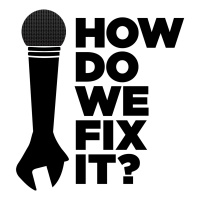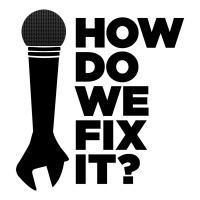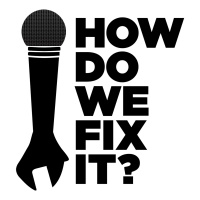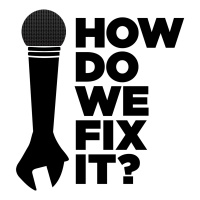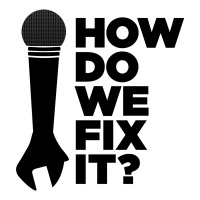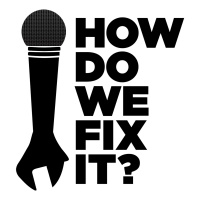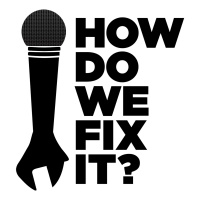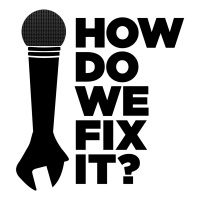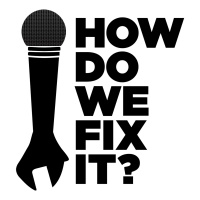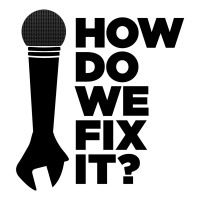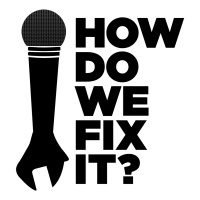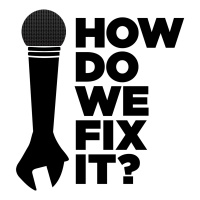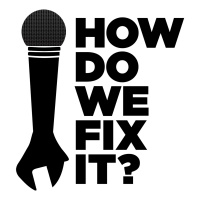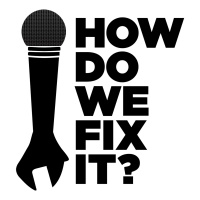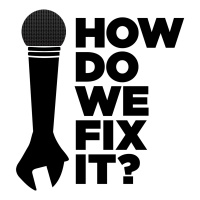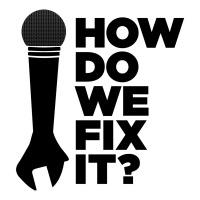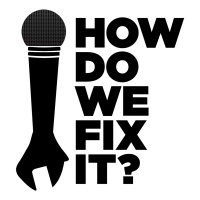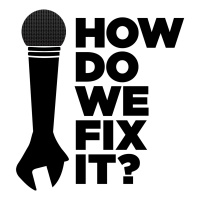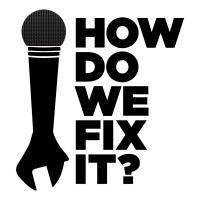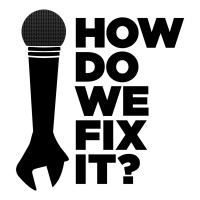How Do We Fix It?
- Autor: Vários
- Narrador: Vários
- Editor: Podcast
- Duración: 186:19:57
- Mas informaciones
Informações:
Sinopsis
From politics to the personal, we're about solutions. Our weekly podcast features two friends and longtime journalists. Join Richard Davies (ABC News) and Jim Meigs (Popular Mechanics) as they challenge authors, experts and provocateurs in a search for positive, practical ideas. Guests include Alan Dershowitz, a noted legal scholar and defender of civil liberties; Mike Rowe of "Dirty Jobs" and Lenore Skenazy, founder of "Free Range Kids." Topics include politics, parenting, personal finance, human behavior and much more. "How Do We Fix It?" - a repair manual for the real world. Produced by DaviesContent
Episodios
-
Risk: An Economist Walks Into a Brothel. Allison Schrager
05/09/2019 Duración: 27minFrom dating to switching jobs and managing retirement. We all manage risk. Want to get better at it?The best way to learn is to ask some of the real experts: Magicians, gamblers, big-wave surfers, horse breeders, and prostitutes. That's what economist, journalist and risk advisor Allison Schrager did. She's our guest in this episode.For people faced with risky decisions every day, making the right choices can be the difference between success or failure, and in some cases, life and death. Allison is the author of the new book "An Economist Walks Into a Brothel: And Other Unexpected Places to Learn About Risk." She visited Nevada's Moonlight Bunny Ranch brothel, hung out with paparazzi who stalked celebrities, spoke with movie makers in Hollywood, and went to a risk conference for surfers in Hawaii as part of her extensive research for the book.We learn basic lessons about human psychology as well as hedging, diversification, leverage and insurance. "You take risks to get wha
-
The Threat From China: Elizabeth Economy
29/08/2019 Duración: 27minA trade war with China is a growing threat to U.S. influence and the global economy. What began more than a year ago with President Trump’s decision to impose tariffs has become an unpleasant economic reality for many American businesses. Recently, the U.S. labeled China a “currency manipulator.” But Perhaps, an even larger long-term threat comes China’s aggressive espionage offensive that is playing out in behind-the-scenes as of the U.S. and China struggle for global dominance.Our guest is Elizabeth Economy, a senior fellow and director of Asia studies at the Council on Foreign Relations in New York. Her most recent book, “The Third Revolution: Xi Jinpeng and the New Chinese State”, explains the background to recent dramatic changes inside China.She is among a distinguished group of China specialists who once favored engagement with Beijing, but are now calling for the United States to take a more forceful approach as China attempts to undermine democratic values.&nbs
-
Rising Risks of Recession: Diana Henriques
22/08/2019 Duración: 25minIs the U.S. economy about to fall off a cliff? Declining growth, financial market jitters, and a growing rift between the U.S. and China are all fueling fears of a recession.For the first time in 12 years, since shortly before the last recession, interest rate yields on 10-year government notes are lower than for short-term loans. This inverted yield curve is highly unusual and the latest sign that a sharp slowdown could happen soon."The inverted yield curve has accurately predicted seven out of the last seven recessions in the past half century, says our guest, award-winning financial journalist and best-selling author Diana Henriques. In this episode we look at the risks of a recession and constructive ways to handle it. These include:- "A calming voice from the cockpit." The need for wise leadership and strong communication skills from The White House.- Experienced financial regulators who know what to do in a crisis.- Greater attention from big business to the needs of s
-
The Case for Trust - Jerry Michalski
15/08/2019 Duración: 26minWe live in a time of suspicion and mistrust. What is this costing all of us in lost productivity, creativity and shared humanity? Isn't there a better way to design our organizations and systems? A recent Pew Research poll found that a majority of Americans believe that most people just look out for themselves, and that they would take advantage of you if they got the chance."We’ve internalized the assumption that humans can’t be trusted, and therefore, that we all need to be constrained and coerced into doing the right thing, pretty much all the time," wrote our guest, technology consultant, futurist and thinker Jerry Michalski, in a recent blog post.And yet, there are examples of systems designed from trust that work surprisingly well. - Anyone can edit and make changes to Wikipedia pages. Most of us rely on this open-source online encyclopedia for accurate information. - Micro loans go to people of very limited means, who should be terrible credit risk
-
Mass Shootings: After El Paso & Dayton
09/08/2019 Duración: 28minMost of America's deadliest mass killings have happened within the last ten years. The deaths of more than 30 people in El Paso, Texas, and Dayton, Ohio, have led to renewed demands for federal background checks and gun violence restraining orders, or "red flag" laws.America is also facing a growing crisis of violent extremism and white nationalist terrorism. The FBI and other law enforcement agencies are under pressure to expand their investigations.In testimony before Congress, FBI Director Christopher Wray, said white supremacy poses a “persistent” and “pervasive” threat to the United States.In this episode, we look at a range of solutions, with the understanding that no single proposal is likely to lead to a dramatic reduction in domestic terrorism, mass shootings, gun homicides, or racial hatred.We hear from James Burnett, Editorial Director of The Trace, an independent news site that covers America's gun violence crisis. He explains that the U.S. has the highest homicide rate among all industrializ
-
Rebuilding The Social Contract: Debilyn Molineaux
01/08/2019 Duración: 25minOur democracy has become a punching bag. From Russian hacking and hate-filled tweets, to demands for impeachment and increasingly nasty political infighting, our public conversation is increasingly narrow, dispiriting and disempowering.According to Pew Research, trust in government is near historic lows. Most Americans believe that declining trust in our public institutions and in each other make it harder to solve key problems. A new poll says 75% of Americans say trust in government is shrinking, while 64% say this is also true for each other-- suggesting we have become more fearful and suspicious.Our guest, Debilyn Molineaux, Executive Director and co-founder of Bridge Alliance, says it's time to restore the nation's social contract. Her organization works to transform the political process by finding new and effective ways to bridge divides in our politics and among our families and local communities. Find out more in this episode.Bridge Alliance has more than 80 member
-
Disaster for Democrats? Daniel Akst
26/07/2019 Duración: 24minPresident Trump's tweets that four minority Democratic congresswomen should “go back” to the countries they came from, and chants of "send her back" at his rally in North Carolina provoked outrage and disgust from his critics. American politics appear trapped in a spiral of toxic fury, and this angry mix may precisely match the pugilistic President's preference as he wades into the 2020 campaign.Our guest, opinion writer and author, Daniel Akst argues that Trump's clear, simple story on the economy, trade with China, and immigration that may appeal to many voters.Despite the President's negative poll ratings, and a chaotic White House, Democrats are having a miserable summer, with a stumbling frontrunner and the rise of the hard left. "They have found themselves in reaction to this horrible man moving ever further from any constraints on immigration of any kind, says Daniel. "I don't think that will play with the voters." We discuss the crisis, look for solutions,
-
Technology for Public Good: Micah Sifry
12/07/2019 Duración: 28minSocial media is under fire for how it threatens our society, our politics, even our mental health.Facebook, Google, Twitter and other tech giants are criticized for spying on us and using secret algorithms to push us toward extreme views.Civic Hall is a key player in a growing movement to use technology to better the world-- what people are calling "civic tech".Our guest, Micah Sifry, co-founder and President of Civic Hall, is a longtime advocate for transparency, better government, and using tech for social change. "The problems that we face as a society are not going to be solved by tech alone," he says. Most of the problem-solving work that we see and support at Civic Hall is, at most, 20% tech and 80% social." In this episode we highlight the work of several groups, including Code For America, which is on a mission to make government work in the digital age, and Ushahidi, an organization that builds tools to solve the world's biggest humanitarian and international development chal
-
Character, Soul & the University: David Brooks
01/07/2019 Duración: 28minColleges and universities can play a virtual role in the moral, intellectual and spiritual development of a student’s life. But there is a growing mismatch between the culture of many campuses, and the challenges young people will face in their careers, politics and personal lives.Author and columnist David Brooks suggested solutions in his stirring speech, “How a University Shaped My Soul”, given at the recent annual conference of Heterodox Academy. He spoke about the life lessons he learned as an undergraduate at The University of Chicago.“Our professors taught us intellectual courage. There is no such thing as thinking for yourself,” he said. “Even the words we think with are collective things, and most of us don’t think for truth, we think for bonding.”Brooks surprised his audience by praising students who challenge their professors, saying “on balance, it’s a good thing.”Since 2003, David Brooks has been an op-Ed columnist at The New York Times. He is an executive director at the Aspen Institut
-
Catholic Church Sex Abuse Crisis: Maggi Van Dorn
20/06/2019 Duración: 32minWill the Catholic Church's sexual abuse crisis ever end? Nearly 18 years since the Boston Globe's Spotlight investigation's shocking revelations, U.S. bishops and The Vatican still struggle to hold the church fully accountable for decades of criminal wrongdoing.Last year's Pennsylvania Grand Jury Report revealed that over 1,000 children had been abused by Catholic priests across six dioceses over seven decades. A new Pew Research Survey finds that a large majority of American Catholics think abuse by clergy is still happening. This episode looks at the crisis from a unique perspective. Maggi Van Dorn, a Catholic committed to healing the Church from the inside, hosts "Deliver Us", a frank and remarkable series of podcasts that spoke with survivors of abuse, advocates and church experts. "The Church is marred in a really ugly way," Maggi tells us. "As a member of this family, it's really incumbent on me to work for reform."We discuss solutions, such as the&
-
Dignity & Respect in Back Row America: Chris Arnade
13/06/2019 Duración: 23minA lot of politicians like to say that there are “two Americas,” but do any of them know what life is really like for the marginalized poor?We speak with journalist and photographer, Chris Arnade, about the forgotten towns and people of back row America. In 2011, Chris left a high-powered job as a bond trader on Wall Street, hit the road, and spent years documenting the lives of poor people, driving 150 thousand miles around the U.S.His new book is "Dignity: Seeking Respect in Back Row America." In his many columns in The Guardian, Chris writes about broken social systems that have betrayed poor people on the margins of society. He speaks to us about drug addicts and prostitutes he met, and their faith, resilience and ties to community."I think if I had one suggestion to policy people, it would be get out of your bubble," says Chris. "I think when you blame a group of people for their behavior, without addressing the situation they find themselves in, then you are doing it wrong."In th
-
What's Wrong With Social Media: Glenn Reynolds
06/06/2019 Duración: 26min"Twitter is like the crystal meth of social media," says our guest, University of Tennessee Law Professor, Glenn Reynolds, founder of the popular political blog, Instapundit. Twitter "is addictive and ultimately unsatisfying."In this episode we look at why social media is poisoning our politics, journalism and relationships by stoking anger, fear, hyper-partisanship and distrust of others. We ask: "how do we fix it?" "Social media is addictive by design. The companies involved put tremendous amounts of thought and effort into making it that way, so that people will be glued to their screens," writes Glenn in his new book, "The Social Media Upheaval." In our podcast, he cites the work of Columbia University Professor Tim Wu, author of "The Curse of Bigness", who warns about the dangers of excessive corporate and industrial concentration. Glenn is sympathetic to calls to break up social media giants and reign in their political and commercial power.Among other solutions discussed
-
Climate Change Politics: Bob Inglis
31/05/2019 Duración: 26minClimate change has never been a leading issue in a Presidential election campaign-- until now. A recent poll found that 82% of Democrats and Democratic-leaning voters said it’s “very important” that their party’s nominee supports taking “aggressive action” to reduce the effects of climate change.2020 could be the climate election. All of the leading Democratic candidates are calling for legislative action, and even many leading Republicans are changing their messaging and how they discuss pollution and the impact on climate.But the environmental politics can cut both ways. While the recent European Parliament election results were a win for green parties, Australia's conservative Prime Minister Scott Morrison won a surprise victory, while resisting calls to sharply reduce carbon emissions and coal production.In this episode, we revisit our interview with for GOP Member of Congress Bob Inglis, who argues that while Donald Trump and fellow Republicans are part o
-
Taking Socialism Seriously: Emily Chamlee-Wright
24/05/2019 Duración: 25minSupport for socialism is surprisingly strong, especially among young Americans, ages 18-29. According to recent polls, they are more likely to have a positive view of socialism than capitalism.Despite socialist economic failures in Venezuela, Africa and Eastern Europe, today's promises of free health care, college loan debt forgiveness, mandatory stock ownership for employees, and guaranteed income look increasingly attractive to a large group of voters in the U.S."Seriously debating socialism gets us talking about a good society really is and the philosophical, economic and political foundations that underlie it," wrote economist Emily Chamlee-Wright this month in The Wall Street Journal.While believing that "competitive and open markets are the answer", Emily tells us in this episode that the debate over socialism allows us to challenge the flawed system of crony capitalism and discuss fundamental moral questions about how our economy is organized.Emily Chamlee-Wright is President and CEO of
-
Human Rights Emergency: Zeid Ra'ad Al Hussein
17/05/2019 Duración: 23minHuman rights have rarely been at greater risk. President Trump and other world leaders are conspicuously silent about torture, the suppression of press freedom and threats to democracy. For the first time in many decades, the U.S. is led by a President who routinely praises foreign dictators, and rarely speaks up for democratic institutions. From the imprisonment of journalists in Turkey and Egypt, widespread torture and killings in Syria, to probable genocide in Myanmar and the murder of Saudi dissident Jamal Khashoggi, the worst human rights offenders are able to act with complete impunity. Today's heads of government are "morally weak, shortsighted, mediocre, and no longer willing or able to defend human rights," says this week's "How Do We Fix It?" guest, Zeid Ra'ad Al Hussein, the former U.N. Human Rights chief. We find out why it wasn't always this way.In this episode, we look at the need for greater media coverage of human rights, and learn more about some of the world's bravest defender
-
Artificial Intelligence Threatens Democracy: Steve Feldstein
09/05/2019 Duración: 28minIs modern technology a force for good or evil? In many countries, digital repression, often powered by artificial intelligence, is a direct threat to freedom and the relationship between citizen and state.China has begun using AI to weaponize social media and mass surveillance in ways that give the Communist government incredible control over what Chinese citizens say and do—and even how they thinkThe Road to Digital Unfreedom: How Artificial Intelligence Is Reshaping Repression" is the title of a groundbreaking research paper in the Journal of Democracy by Steven Feldstein, former Deputy Assistant Secretary for Democracy, Human Rights and Labor. Steve is a Professor at Boise State University and our guest for this episode. "What's surprising to me is just how a few governments are using surveillance to get inside almost every kind of action they might be interested in from certain individuals," Steve tells us. We discuss the coordinated use in China's Xianjong province of DNA readers, facial r
-
Country Over Party: Nick Troiano
02/05/2019 Duración: 30minAngry rhetoric, narrow partisanship, and leaders who appeal only to their base are all reasons why American politics is in urgent need of reform.By huge majorities, the public has a negative view of Congress and believes the system is broken.Our guest, 29-year-old Nick Troiano, Executive Director of Unite America, is a leading voice of the reform movement, who supports changes aimed at reducing gridlock, boosting voter participation, and finding common ground. "We are caught in a democracy that is spiraling in a very negative direction and the question before us is how do we break that," Nick tells us.Among his solutions:- End gerrymandering. Independent commissions, not partisan legislators, would decide the shape Congressional districts.- Ranked-choice voting. Instead of choosing just one candidate, voters would have the option of ranking candidates according to their preference.- Reform primary rules, and allow independents to vote in party primaries.- Campaign finan
-
Risk: An Economist Walks Into a Brothel. Allison Schrager
25/04/2019 Duración: 27minFrom dating to switching jobs and managing retirement. We all manage risk. Want to get better at it?The best way to learn is to ask some of the real experts: Magicians, gamblers, big-wave surfers, horse breeders, and prostitutes. That's what economist, journalist and risk advisor Allison Schrager did. She's our guest in this episode.For people faced with risky decisions every day, making the right choices can be the difference between success or failure, and in some cases, life and death. Allison is the author of the new book "An Economist Walks Into a Brothel: And Other Unexpected Places to Learn About Risk." She visited Nevada's Moonlight Bunny Ranch brothel, hung out with paparazzi who stalked celebrities, spoke with movie makers in Hollywood, and went to a risk conference for surfers in Hawaii as part of her extensive research for the book.We learn basic lessons about human psychology as well as hedging, diversification, leverage and insurance. "You take risks to get what you want
-
You Are What You Read - Jodie Jackson
18/04/2019 Duración: 23minAre you depressed when you read the news? The media's rampant negativity, with a daily emphasis on outrage and crisis, is a form of mental pollution that misinforms the public, harms democracy, and leads a distorted view of the world."You Are What You Read", by Jodie Jackson, is a call for reform. Written by a non-journalist, the book looks at the psychological impact of reading endlessly negative news, and shows viewers, listeners and readers how to protect themselves and change their media diet. "We need learn about how problems are being solved, issues being resolved for the sake of our souls," says Jodie in her YouTube video, promoting her book."This is not a call for us to ignore the negative, but rather to not ignore the positive," Jodie tells us. "The most important thing from this research showed that learning about solutions can make us feel more empowered." See acast.com/privacy for privacy and opt-out information.
-
Having Better Conversations
11/04/2019 Duración: 24minAt a time of information overload, social media silos and political paralysis, how can all of us be better communicators? In this 200th episode, Richard and Jim share lessons they've learned about listening, asking questions and interviewing guests during nearly four years of "How Do We Fix It?"It's been a fun run, and many more episodes are being planned in the weeks and months come. This week, we discuss the show's origin story and how we've leveraged the intimacy of podcasting to change some of the questions we ask guests and how we record each conversation. We include extracts from past shows to illustrate how to ask better questions. There's also a short blooper real: Examples of questions that should not have been asked!This episode includes some hallmarks of constructive conversations: Focus on facts and evidence, acknowledge and listen to evidence that contradicts your position, and be respectful. Using humor and humility, establishing eye contact, asking brief follow-up questions are also useful

